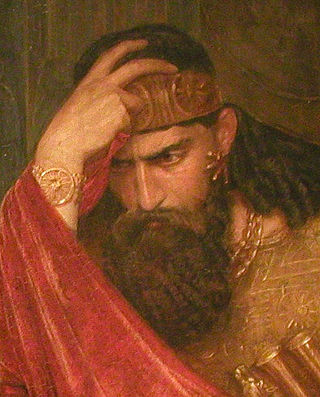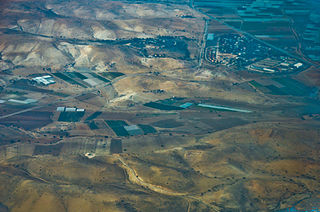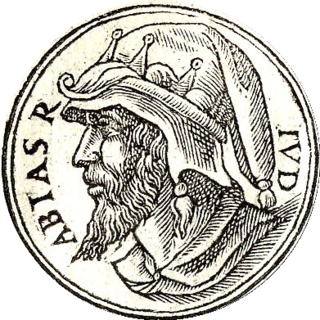
Mephibosheth (Biblical Hebrew: מְפִיבֹשֶׁת, Məfīḇōšeṯ, also called Meribaal, מְרִיב־בַּעַל, Mərīḇ-Baʻal), or Miphibosheth, was the son of Jonathan—and, thus, a grandson of Saul—mentioned in the Biblical Books of Samuel [1] [2] and Chronicles.

Mephibosheth (Biblical Hebrew: מְפִיבֹשֶׁת, Məfīḇōšeṯ, also called Meribaal, מְרִיב־בַּעַל, Mərīḇ-Baʻal), or Miphibosheth, was the son of Jonathan—and, thus, a grandson of Saul—mentioned in the Biblical Books of Samuel [1] [2] and Chronicles.
Mephibosheth was five years old when both his father and grandfather died at the Battle of Mount Gilboa. After the deaths of Saul and Jonathan, Mephibosheth's nurse took him and fled in panic. (2 Samuel 4:4) In her haste, [3] the child fell, or was dropped while fleeing. [4] After that, he was unable to walk. [5]
After the accident, Mephibosheth was carried with the rest of his family beyond the Jordan to the mountains of Gilead, where he found refuge in the house of Makhir ben Ammiel, a powerful Gadite or Manassite headman at Lo-debar, not far from Mahanaim, which during the reign of his uncle Ishbosheth was the headquarters of his family. [6]
Some years later, after his accession to the kingship of the United Monarchy, King David sought "someone of the house of Saul, to whom I may show the kindness of God" [7] and Mephibosheth was brought to him. Old Testament scholar Walter Brueggemann says the mention of Mephibosheth's disability may have been added to show that he was not a military or political threat to David. [8]
David restored Saul's inheritance to Mephibosheth and permitted him to live within his palace in Jerusalem.
According to 2 Samuel 9:12, 1 Chron 8:34 and 1 Chron 9:40 he had a son called Micah.
He is called Mephibosheth, meaning "from the mouth of shame", in the Books of Samuel while the Books of Chronicles (8:34 and 9:40) call him Meribbaal. [9] Arnold Gottfried Betz and David Noel Freedman argue that Memphibaal, a name preserved in the Lucianic recension may actually be the original name of Jonathan's son, while Meribbaal may originally refer to one of Saul's sons. [9]
There is some scholarly agreement that Mephibosheth replaced Meribbaal (or Memphibaal) in order to conceal the theophoric name "baal", a reference to a Canaanite deity, which became taboo. [3]

The Book of Samuel is a book in the Hebrew Bible, found as two books in the Old Testament. The book is part of the Deuteronomistic history, a series of books that constitute a theological history of the Israelites and that aim to explain God's law for Israel under the guidance of the prophets.

David was, according to the Hebrew Bible, the third king of the United Kingdom of Israel. Historians of the Ancient Near East agree that David probably lived c. 1000 BCE, but little more is known about him as a historical figure.

Saul was, according to the Hebrew Bible, the first monarch of the United Kingdom of Israel. His reign, traditionally placed in the late 11th century BC, supposedly marked the transition of Israel and Judah from a scattered tribal society ruled by various judges to organized statehood.

Abel-meholah was an ancient city frequently mentioned in the Hebrew Bible. It is best known for being the birthplace and residence of the prophet Elisha. It is traditionally located near the Jordan River, south of Beit-She'an.

Abijam was, according to the Hebrew Bible, the fourth king of the House of David and the second of the Kingdom of Judah. He was the son of Rehoboam and the grandson of Solomon. The Books of Chronicles refer to him as Abijah.
Ahinoam is a Hebrew name literally meaning brother of pleasantness, or my brother is pleasant, thus meaning pleasant.

Shallum of Israel, was the fifteenth king of the ancient Kingdom of Israel, and the son of Jabesh. The Shallum dynasty, or the House of Shallum was an ephemeral dynasty, represented only by Shallum.
Jabesh-Gilead, sometimes shortened to Jabesh, was an ancient Israelite town in Gilead, in northwest Jordan. Jabesh is mentioned several times in the Hebrew Bible primarily in connection with King Saul's battles against the Ammonites and Philistines.
Hadadezer, son of Rehob, was king of Zobah, a Syrian (Aramaean) kingdom that may have been in the Beqaa valley of Lebanon, extended along the eastern side of the Anti-Lebanon Mountains reaching Hamath to the north. The kingdom of Zobah exercised power throughout southern Syria, and inevitably clashed with the expanding empire of Israel.

Armoni and Mephibosheth are named in the Hebrew Bible as the two sons of Saul by his concubine Rizpah, daughter of Aiah. After Saul's death, they were killed in revenge for his violence against the Gibeonites.
Lo-debar was a town in the Old Testament in Gilead not far from Mahanaim, north of the Jabbok river in ancient Israel. It is mentioned in the Hebrew Bible as the home of Machir, a contemporary of David..

Jonathan is a figure in the Book of Samuel of the Hebrew Bible. In the biblical narrative, he is the eldest son of King Saul of the Kingdom of Israel, and a close friend of David. He is described as having great strength and swiftness and excelling in archery and slinging.
Helam is a Hebrew Bible place name. According to 2 Samuel 10:15-18, Helam was the site of King David's victory over the Syrians under Hadarezer. It may be associated with modern Alma, Israel, about 55 km (34 mi) east of the Sea of Galilee.

1 Samuel 13 is the thirteenth chapter of the First Book of Samuel in the Old Testament of the Christian Bible or the first part of the Books of Samuel in the Hebrew Bible. According to Jewish tradition the book was attributed to the prophet Samuel, with additions by the prophets Gad and Nathan, but modern scholars view it as a composition of a number of independent texts of various ages from c. 630–540 BCE. This chapter contains Saul's act of disobedience after his coronation. This is within a section comprising 1 Samuel 7–15 which records the rise of the monarchy in Israel and the account of the first years of King Saul.

1 Samuel 20 is the twentieth chapter of the First Book of Samuel in the Old Testament of the Christian Bible or the first part of the Books of Samuel in the Hebrew Bible. According to Jewish tradition the book was attributed to the prophet Samuel, with additions by the prophets Gad and Nathan, but modern scholars view it as a composition of a number of independent texts of various ages from c. 630–540 BCE. This chapter contains the account of David's escape from Saul's repeated attempts to kill him. This is within a section comprising 1 Samuel 16 to 2 Samuel 5 which records the rise of David as the king of Israel.

1 Samuel 24 is the twenty-fourth chapter of the First Book of Samuel in the Old Testament of the Christian Bible or the first part of the Books of Samuel in the Hebrew Bible. According to Jewish tradition the book was attributed to the prophet Samuel, with additions by the prophets Gad and Nathan, but modern scholars view it as a composition of a number of independent texts of various ages from c. 630–540 BCE. This chapter contains the account of David's escape from Saul's repeated attempts to kill him. This is within a section comprising 1 Samuel 16 to 2 Samuel 5 which records the rise of David as the king of Israel.

1 Samuel 31 is the thirty-first chapter of the First Book of Samuel in the Old Testament of the Christian Bible or the first part of the Books of Samuel in the Hebrew Bible. According to Jewish tradition, the book was attributed to the prophet Samuel, with additions by the prophets Gad and Nathan, but modern scholars view it as a composition of a number of independent texts of various ages from c. 630–540 BCE. This chapter contains the account of Saul's repeated attempts to kill him. This is within a section comprising 1 Samuel 16 to 2 Samuel 5 which records the rise of David as the king of Israel.

2 Samuel 9 is the ninth chapter of the Second Book of Samuel in the Old Testament of the Christian Bible or the second part of Books of Samuel in the Hebrew Bible. According to Jewish tradition the book was attributed to the prophet Samuel, with additions by the prophets Gad and Nathan, but modern scholars view it as a composition of a number of independent texts of various ages from c. 630–540 BCE. This chapter contains the account of David's reign in Jerusalem. This is within a section comprising 2 Samuel 9–20 and continued to 1 Kings 1–2 which deal with the power struggles among David's sons to succeed David's throne until 'the kingdom was established in the hand of Solomon'.

2 Samuel 16 is the sixteenth chapter of the Second Book of Samuel in the Old Testament of the Christian Bible or the second part of Books of Samuel in the Hebrew Bible. According to Jewish tradition the book was attributed to the prophet Samuel, with additions by the prophets Gad and Nathan, but modern scholars view it as a composition of a number of independent texts of various ages from c. 630–540 BCE. This chapter contains the account of David's reign in Jerusalem. This is within a section comprising 2 Samuel 9–20 and continued to 1 Kings 1–2 which deal with the power struggles among David's sons to succeed David's throne until 'the kingdom was established in the hand of Solomon'.
{{cite book}}: CS1 maint: multiple names: authors list (link)